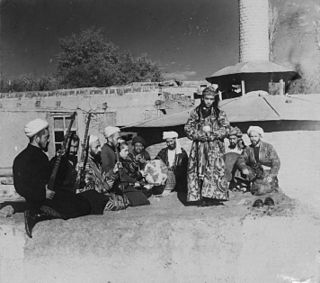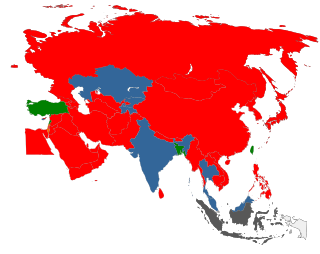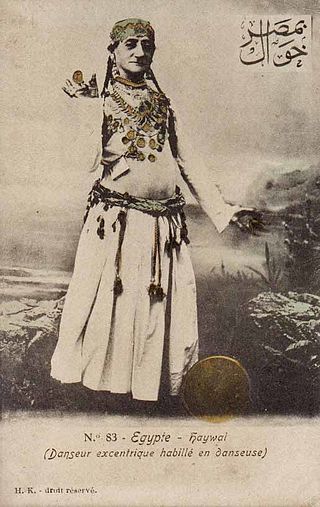
Sexual slavery and sexual exploitation is an attachment of any ownership right over one or more people with the intent of coercing or otherwise forcing them to engage in sexual activities. This includes forced labor that results in sexual activity, forced marriage and sex trafficking, such as the sexual trafficking of children.

Child prostitution is prostitution involving a child, and it is a form of commercial sexual exploitation of children. The term normally refers to prostitution of a minor, or person under the legal age of consent. In most jurisdictions, child prostitution is illegal as part of general prohibition on prostitution.

The köçek was typically a very handsome young male slave effeminate dancer (rakkas), who usually cross-dressed in feminine attire, and was employed as an entertainer.

Bacha bāzī is a practice in which men buy and keep adolescent boys for entertainment and sex. It is a custom in Afghanistan and in historical Turkestan and often involves sexual slavery and child prostitution by older men of young adolescent males. It might also be practiced by Afghan refugees in Pakistan.

Lesbian, gay, bisexual, and transgender (LGBT) people in the Islamic Emirate of Afghanistan face severe challenges not experienced by non-LGBT residents. Afghan members of the LGBT community are forced to keep their gender identity and sexual orientation secret, in fear of violence and the death penalty. The religious nature of the country has limited any opportunity for public discussion, with any mention of homosexuality and related terms deemed taboo.
Sex Slaves is a 2005 documentary film by Ric Esther Bienstock that was produced in association with CBC, Frontline (PBS), Channel 4 and Canal D.

Jamie Doran is an Irish-Scottish independent documentary filmmaker and former BBC producer. He founded the multi award-winning company Clover Films, based in Windsor, in 2008. He is also the Club President of Datchet Village FC, which he founded in 1986.

Situational sexual behavior differs from that which the person normally exhibits, due to a social environment that in some way permits, encourages, or compels the behavior in question. This can include situations where a person's preferred sexual behavior may not be possible, so rather than refraining from sexual activity completely, they may engage in substitute sexual behaviors.

Prostitution is the business or practice of engaging in sexual activity in exchange for payment. The definition of "sexual activity" varies, and is often defined as an activity requiring physical contact with the customer. The requirement of physical contact also creates the risk of transferring diseases. Prostitution is sometimes described as sexual services, commercial sex or, colloquially, hooking. It is sometimes referred to euphemistically as "the world's oldest profession" in the English-speaking world. A person who works in this field is called a prostitute, and sometimes a sex worker, but the words hooker and whore are also sometimes used to describe those who work as prostitutes.

Prostitution in Pakistan is a taboo culture of sex-trade that exists as an open secret but illegal. Prostitution is largely based in organisational setups like brothels or furthered by individual call girls.
Prostitution is illegal in Afghanistan, with punishments ranging from 5 to 15 years of imprisonment. The country is deeply religious and one of the most conservative countries in the world, where sex outside marriage is not only against the law but could lead to serious consequences, even capital punishment.

Pederasty or paederasty is a sexual relationship between an adult man and a boy. It was a socially acknowledged practice in Ancient Greece and Rome.

Prostitution has been practiced throughout ancient and modern cultures. Prostitution has been described as "the world's oldest profession," although the oldest professions are most likely farmers, hunters, and shepherds.

Half the Sky: Turning Oppression into Opportunity for Women Worldwide is a nonfiction book by husband and wife team Nicholas Kristof and Sheryl WuDunn published by Knopf in September 2009. The book argues that the oppression of women worldwide is "the paramount moral challenge" of the present era, much as the fight against slavery was in the past. The title comes from the 1968 statement by Mao Zedong"妇女能顶半边天", meaning "women hold up half the sky", though the authors cite it only as a "Chinese proverb".
Najibullah Quraishi is an Afghan journalist and filmmaker.
Afghanistan is one of the source, transit, and destination country for men, women, and children who are subjected to trafficking in persons, specifically forced labor and forced prostitution. Trafficking within Afghanistan is more prevalent than transnational trafficking, and the majority of victims are children. In 2005 the Afghan Independent Human Rights Commission (AIHRC) reported 150 child trafficking cases to other states. Afghan boys and girls are trafficked within the country and into Iran, Pakistan and India as well as Persian gulf Arab states, where they live as slaves and are forced to prostitution and forced labor in brick kilns, carpet-making factories, and domestic service. In some cases the boys and girls were used for organ trafficking. Forced begging is a growing problem in Afghanistan; Mafia groups organize professional begging rings. Afghan boys are subjected to forced prostitution and forced labor in the drug smuggling industry in Pakistan and Iran. Afghan women and girls are subjected to forced prostitution, arranged and forced marriages—including those in which husbands force their wives into prostitution—and involuntary domestic servitude in Pakistan and Iran, and possibly India. Non-governmental organizations (NGOs) report that over the past year, increasing numbers of boys were trafficked internally. Some families knowingly sell their children for forced prostitution, including for bacha bazi - a practice combining sexual slavery and child prostitution, through which wealthy men use harems of young boys for social and sexual entertainment. Other families send their children with brokers to gain employment. Many of these children end up in forced labor, particularly in Pakistani carpet factories. NGOs indicate that families sometimes make cost-benefit analyses regarding how much debt they can incur based on their tradable family members.
Bacha posh is an Afghan tradition in which some families without sons will pick a daughter to live and behave as a boy. This enables the child to behave more freely: attending school, escorting her sisters in public, and working.

The trafficking of persons is the fastest growing and most profitable criminal activity after drug and arms trafficking. According to the United Nations Protocol to Prevent, Suppress and Punish Trafficking in Persons, Especially Women and Children, human trafficking is defined as follows: “Trafficking in persons shall mean the recruitment, transportation, transfer, harboring or receipt of persons, by means of the threat or use of force or other forms of coercion, of abduction, of fraud, of deception, of the abuse of power or of a position of vulnerability or of the giving or receiving of payments or benefits to achieve the consent of a person having control over another person, for the purpose of exploitation. Exploitation shall include, at a minimum, the exploitation of the prostitution of others or other forms of sexual exploitation, forced labor or services, slavery or practices similar to slavery, servitude or the removal of organs.”
This Is What Winning Looks Like is a 2013 documentary by Ben Anderson. It covers the troubled efforts by the International Security Assistance Force (ISAF) during the 2001–2021 War in Afghanistan to train the Afghan National Security Forces (ANSF) and assist in rebuilding key government institutions. The title of the film is a 2013 quote from US General John R. Allen.

The khawal was a traditional native Egyptian male dancer cross-dressed in feminine attire and was popular up until the late eighteenth and early nineteenth centuries.













